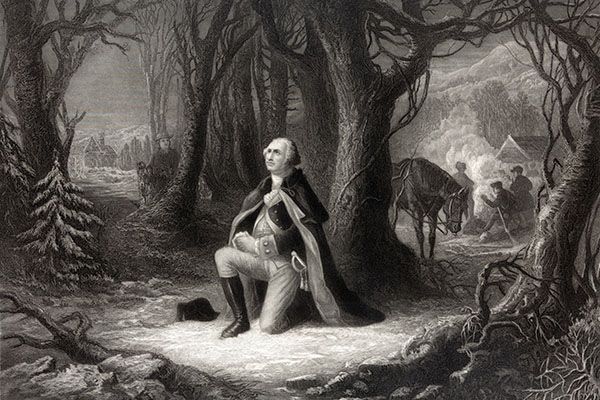5 Noble Attributes of George Washington
February 18, 2017 • Blog Post
Presidents Day is not about sales or staying home from school. It’s about remembering the honorable men who turned their ideals into our reality. We’ve all heard stories and read textbooks about our founding fathers, but in BYU devotionals, they are more than just history lessons. They become case studies for implementing attributes of Christ. Here is a short list of George Washington’s qualities that devotional speakers have highlighted.

A Man of Gratitude
Our forefathers understood well their dependence on God. George Washington, in his proclamation establishing the 1789 Thanksgiving celebration, said in part,
Whereas, it is the duty of all nations to acknowledge the providence of almighty God, to obey his will, to be grateful for his benefits, and humbly to implore his protection and favor. . . that we may then all unite in rendering unto him our sincere and humble thanks for his kind care and protection of the people of this country.
—John B. Stohlton, “What Think You of Thanksgiving?” November 20, 1984
A Man of Faith
Although many members of the Constitutional Convention neither belonged to any church or professed to be of religious persuasion, it is apparent that the leaders believed in a divine providence and openly sought and acknowledged the guiding hand of the Lord in all that they did.
George Washington, in his inaugural address, stated:
. . . we ought to be no less persuaded that the propitious smiles of Heaven can never be expected on a nation that disregards the eternal rules of order and right which Heaven itself has ordained.
—Ernest L. Wilkinson, “America 1776–1976,” August 17, 1976
A Man of Fairness
In 1790, at a time when western Europe excluded Jews from the full rights of citizenship, including the ability to hold public office, President George Washington wrote a memorable letter to the Jewish congregation in Newport, Rhode Island. They had written congratulating him on his election. In reply, Washington assured them that
the Government of the United States, which gives to bigotry no sanction, to persecution no assistance, requires only that they who live under its protection should [conduct] themselves as good citizens.
He included a prayer for their welfare:
May the children of the stock of Abraham who dwell in this land continue to merit and enjoy the good will of the other inhabitants—while every one shall sit in safety under his own vine and fig tree and there shall be none to make him afraid.
No one who knows the difficult history of the Jewish people, or their fate during succeeding generations, can fail to be impressed by Washington’s affirmation of religious freedom.
—Todd Christofferson, “Religious Freedom—A Cherished Heritage to Defend,” June 26, 2016
A Man of Meekness
He was willing to be meek—that’s teachable. The Greek translation of that word meek in the New Testament means to be teachable, to be willing to listen, willing to cooperate. It certainly describes the attitude of George Washington. Through his willingness to listen and to cooperate, Washington made decisions deliberately. He would not be rushed into a decision, but rather he would wait until as many facts as possible could be obtained regarding the matter under consideration. The strength of such a quality became evident several times during the war for independence.
—Rex D. Pinegar, “Experience, Excellence, and Obedience = Character,” September 6, 1981
A Man of Courage
I think God guarded [George Washington] as he went through all this adversity. It is said that an Indian bullet missed him just by inches as he was fighting the Indians. And that bullet, had it struck its mark, would have changed, no doubt, the course of history. But he lived. He was the most unlikely of rebels. He had everything to lose in the revolutionary cause: his great fortune, his fame, his honor, and—as a “damned rebel”—life itself if he was captured. Once it had been his pride to serve England, but now with that spirit of liberty he put himself on line, at last convinced that the very rights of Englishmen were at stake. The many retreats, the many losses came. . . . His courage, his purpose, his holding power, could never be conquered. That’s the spirit that has been in America ever since that day.
—John H. Vandenberg, “Patriotism Is of God,” March 4, 1973



